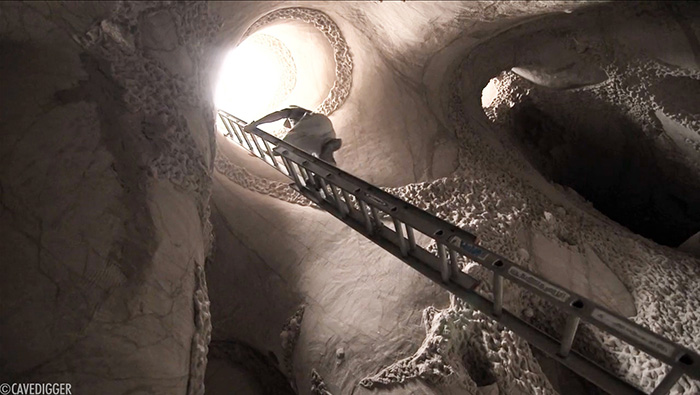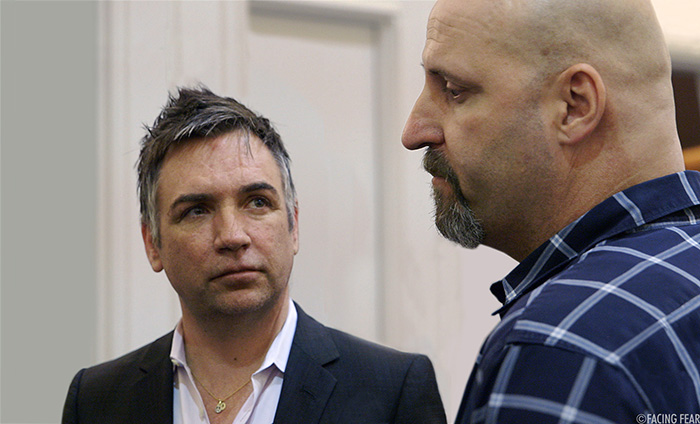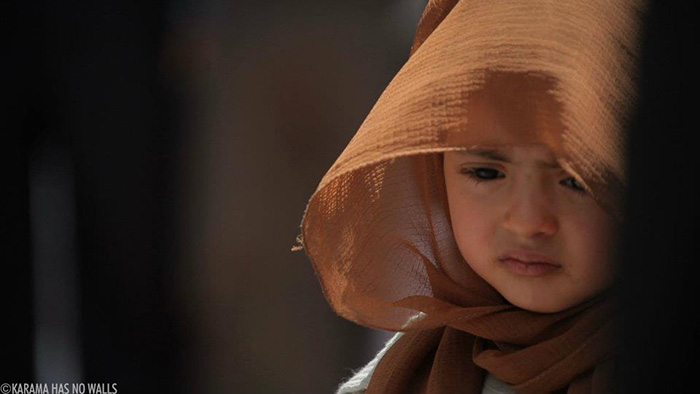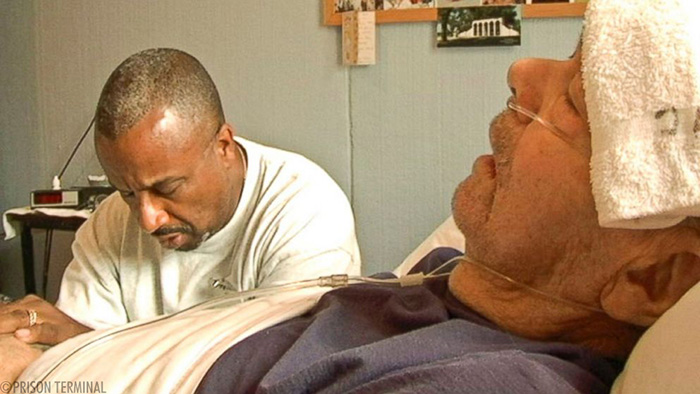Ahead of the Academy Awards, we’re reviewing each short category. See the documentary section below, animated here, and live-action here.

Cavedigger – USA – 39 minutes
Sculptor Ra Paulette is an amazing artist. His philosophical manifesto for space and the metaphor of interior versus exterior is well-put and meticulously brought to life through malleable sandstone to create unimaginable beauty in a collision of Mother Nature and mankind’s mark as builder. I couldn’t help but remember my days as a freshman art student dealing with a project entitled “Containment” wherein we had to play with aesthetics and utility in order to embody the word. We had an allotment of wood and glue; Paulette has the entirety of New Mexico’s landscape. And while his gorgeously intricate caves become the result of his profession, it is the doing that truly becomes the most fruitful part of the exercise.
This is a good thing considering Jeffrey Karoff‘s documentary Cavedigger shows how few of Paulette’s projects actually saw completion. Whether the unwavering attitude of his benefactors believing they were in charge of a creative “team” or the dwindling funds from finished pieces estimated at two months taking over two years, much of what’s begun ends in disappointment. Ra isn’t one to dwell on these failures, however, since they are out of his control. Either God’s earth or the people letting him dig on their land give up—Paulette himself never quits until he’s locked out of the site and pushed off to the next magnum opus to spend his time. And time it takes, enough to prove to all those around him the real price of genius.
The short succeeds because it doesn’t try to get by solely as a biography about an eclectic artist and his magnificent work. Karoff attempts to dig deeper into motivations and consequences of what it means to create for oneself instead of financial gain. He interviews two owners who stopped production on commissioned caves—Christina Stevens and David Heath—to detail the aftermath of battling egos defeating artistic vision. And we meet friends Liz Riedel and Shel Nymark to witness the result of providing carte blanche to scrape away to his heart’s content. We see the stunning religious experience completion conjures against the roughly rushed tombs of potential courtesy of unwillingness to let him create. Don’t get me wrong, Stevens and especially Heath have caves worthy of tourist traffic, but Riedel’s allows us to understand their missions were unfulfilled.
Paulette is an artist and the way he handles himself proves such because he’s conscious his art comes at the detriment of human relationships. His wife Paula Seaton is a saint to stand by and support them financially while he’s off in with his shovel and wheelbarrow because we know Ra would pick the work over her any day. But it’s hard to deny this self-taught dropout sculpting caves for twenty-five years that ability because he’s using nature’s canvas like no one else today. The film is a bit schizophrenic in its want to rally around him one second before letting us see him as a self-serving bully and brat, but I applaud Karoff for putting both onscreen since every great artist possesses this duality. Ultimately his artwork’s legacy will say whether it was worth it and looking at these caves I’d say it was.
B

Facing Fear – USA – 23 minutes
While it may be a “talking head” documentary, Jason Cohen‘s Oscar nominated short Facing Fear is anything but boring or static. It’s a story about two men who grew up in fear of the unknown, the different. Matthew Boger had a very Christian upbringing where his being gay found even worse disgust at home than that of his classmates at school. Tim Zaal grew up in an Anglo neighborhood feeding on the aggression of the punk movement in a non-constructive way at a time when an African American shot his brother. Matthew was thrown out on the streets and Tim took to them with a Mohawk and an attitude for pain.
They both had fear—one was victimized by it while the other was the victimizer so he wouldn’t have to—and both collided one fateful night in their twenties that left the former for dead. It’s an incident neither could ever fathom forgetting, each pretending it didn’t happen as they moved on in disparate directions to bury it until its last remnants remained in nightmare. Matthew got himself off the streets and into a career advocating the tolerance no one in his life ever showed him while Tim became a full-fledged white supremacist until age and the progressing culture opened his eyes to the pain he wrought. And then the unthinkable happened: they found themselves sitting across from one another twenty-five years after that first encounter, neither knowing what to say.
Cohen’s document of where they’ve gone since is probably the same speech and content as the talks Matthew and Tim give to promote compassion, empathy, and forgiveness. It may not sound original as a result, but what better way to expand their message’s reach than to put it on film and subsequently on a stage that could very well earn it an award in front of millions on primetime television? Facing Fear doesn’t need visual tricks or cheesy reenactments when it has two confident orators relaying their poignant story and evolution that we’re all capable of achieving if we let the pain and anger in ourselves go away to help accomplish the same with those around us. When the story is this remarkable—and it should be required viewing for schools nationwide—talking heads are more than enough.
A-

The Lady In Number 6 – USA – 39 minutes
Despite starting with a smile watching 109-year old Alice Herz Sommer playing classical music on her piano, we know there will be more to The Lady In Number 6 than simply learning how beloved she is to those in her building woken at 10am to the sounds of Chopin and Bach. It’s in her age, face, and Czech accent where thoughts of WWII and the Nazis conjure our wonder as to when the tragic circumstances of her freedom will be introduced. But somehow her telling it doesn’t seem as tragic as we know it was. Her unwavering optimism—the attitude that helped her become the oldest living Holocaust survivor today—spins the experience as one that gave purpose to her life. It taught her how hatred only breeds hatred so we might as well love instead.
Malcolm Clarke’s documentary short (co-written by Carl Freed) takes us along the trajectory of this woman’s life from birth in Prague to the luminary family friends that populated her childhood like Franz Kafka to her love of the piano, her husband, and their son Raphael. Then March 15, 1939 arrives with Nazi tanks driving down the street to turn her family and every other Jewish household into second-class citizens to be arrested, silenced, and ultimately killed. Her friend Zdenka Fantlova talks about that morning against archival photos and footage, herself an actress taken to Theresienstadt alongside Alice and many other “celebrity intellectuals” in order to document their art as the “average concentration camp experience” for international consumption. It was a place where music became more than simple entertainment—it became life itself.
Add their other friend Anita Lasker-Wallfisch and you have a trio of aged survivors explaining what it was like to live with hope inside a place without. Alice performed to keep herself and her son smiling yet found her Chopin also enraptured the guards caught standing outside the concert hall’s windows. Anita played cello in the symphony at Auschwitz—fully aware her talent saved her life—while Zdenka survived death despite the hundreds of corpses surrounding her because she refused to label herself a victim. Their stories are heroic, uplifting, and rivetingly inspiring considering they find themselves able to voice the choked up words “I’m grateful for that experience”, but it’s difficult to see their trajectories without that of so many others who didn’t have it so lucky.
I hate saying their experience was easier since it was still unconscionable, but it kind of was. These women had the kind of talent Nazis held in high esteem to be manipulated to their means. The film glosses over Alice’s husband being killed in another camp as well as their parents being taken and never seen again. Yes, it’s amazing they’re able to tell their tale with full hearts and complete knowledge of life’s preciousness, but I couldn’t help noticing the film’s incongruous rosy-colored sheen. Anita playing cello for the “Angel of Death” (Josef Mengele) is an intriguing tidbit, but it’s nothing compared to someone saved by Allied troops minutes before entering the gas chamber. The Lady In Number 6 tells a great story of three talented ladies, but a lot is left unspoken to do so.
C+

Karama Has No Walls – USA – 27 minutes
The last words Anwar Al-Muaati spoke to his father upon leaving for “Change Square” in Sana’a, Yemen were, “If you tell me I can’t go and all the other fathers tell their sons the same, who will fight the revolution?” That’s a powerful sentiment of patriotism, freedom, and want for peace most born in the United States simply cannot comprehend. Anwar was one of 53 innocent, non-violent protestors who died on March 18, 2011, a day known as Juma’at El-Karama (Friday of Dignity). They were there to participate in a sit-in to hopefully see change like that which occurred in Egypt and its overthrow of Hosni Mubarak’s dictatorship. Wanting President Ali Abdullah Saleh’s 33-year rule to end, they left their weapons at home, set up tents, and sat in the streets unaware of what was to come.
Directed by Sara Ishaq, Karama Has No Walls utilizes uncensored footage of that day shot by 17-year old Nasr Al-Namir and 23-year old Khaled Rajeh. We see the wall “thugs” built to separate the sit-in from the neighborhood, witness anonymous hands above it pouring petrol while the protestors are at prayer, and gasp as flames rise into the sky to put everyone on edge. Both cameramen describe the scene and the carnage while we watch the sniper fire begin to put Yemeni citizens on the ground in pools of blood. It’s a harrowingly first-hand account of civil war and the oppressive power of a government that does not have the people’s vote. Ishaq shows it all, letting reality unfold in the chaotic insanity of a tragic day that rallied a country awake.
A film containing just this type of gruesome and unconscionable footage can conjure feelings of detachment as you trick yourself to keep watching because it happened miles and miles away to nameless people you don’t know. So rather than make it solely a bold news document, Ishaq also adds the personal stories of Anwar and eleven-year old Saleem Al-Harazi. She interviews their fathers to get a grip on the pain, pride, and sacrifice—two men who saw their boys on Al-Jazeera unaware of what was actually happening. Their accounts will move you to tears as you witness civil war a world away. True change has casualties, martyrs, and heroes who stood up or sat down, refusing to retreat no matter the pressure. A nightmare for so many families, Juma’at El-Karama also proves a rallying cry for peace.
A

Prison Terminal – USA – 40 minutes
Born George William, PFC “Jack” Hall served four years in the military during WWII, was a POW, and ultimately found his way back home. Unable to shake what he saw and did in war, the feeling to kill anyone who crossed him remained. So, when his youngest son hung himself after battling drug addiction since the age of fourteen, the chance for revenge was too much to ignore. Hall came across the dealer that hooked his son bragging about his occupational success and took it upon himself to ensure no one else’s children suffered the same fate as his. It earned him a life sentence at the age of sixty—in total 21 years behind bars with 12 permanently spent in the infirmary after a heart attack. These are his final moments.
Edgar Barnes’ Oscar nominated documentary short Prison Terminal: The Last Days of Private Jack Hall centers on inmate #801309, yet its true story is larger than just one man. Funded by private investors with prisoner assistance, Iowa State Penitentiary’s maximum-security establishment in Ft. Madison became one of the few prisons fitted with a Hospice program in 2005. Run by specially trained inmates, two of the infirmary cellblock’s rooms were re-designated for those on their deathbed without chance of recovery. Led by Herky (life sentence for murder) and his team of Glover (life sentence for murder) and Love (life sentence for kidnapping), the program makes it so no one has to die alone while also providing this trio the opportunity to be someone no one thought they could.
Shot with unfettered access—those squeamish about the sight of dead bodies no matter how peaceful be warned—we witness a love that transcends who these men were on the outside. It is a colorblind love that helps a hardened, segregationist drunk allow three burly black men to become his best friends and closest family. We see the care and dignity given by director of nursing Marilyn Sales, understand the power of human connection no matter your unforgiveable actions, and watch as a man takes his last breaths while someone sits at his bedside 24/7 despite resting in a place known for its isolation. You may say it’s undeserved or perhaps that a guy like Jack can receive a pass because he “cleaned the streets” so to speak, but you can’t make that call.
Prison Terminal is about mankind, compassion, and the ability to repent through action rather than words. Looking at Jack struggle to breathe with his other son Don Skinner by his side doesn’t conjure thoughts about killers or monsters—he’s simply a man again despite the government-sanctioned number replacing his name. The same goes for the eloquent grace of Herky as his deeds almost make you forget he committed his own crime of amoral horror too. Barens isn’t saying we should forgive them or free them; he’s simply showing us a poignant look at prisoners rallying around each other in a time of need much like we do in society. If you still believe they should die alone, well that says more about the hate in your heart than any irrefutable truth.
And if you miss it in theaters, Prison Terminal will make its HBO debut on March 31st.
B+
The Oscar Nominated Shorts are now showing in limited theatrical release. See the official site for more details.

